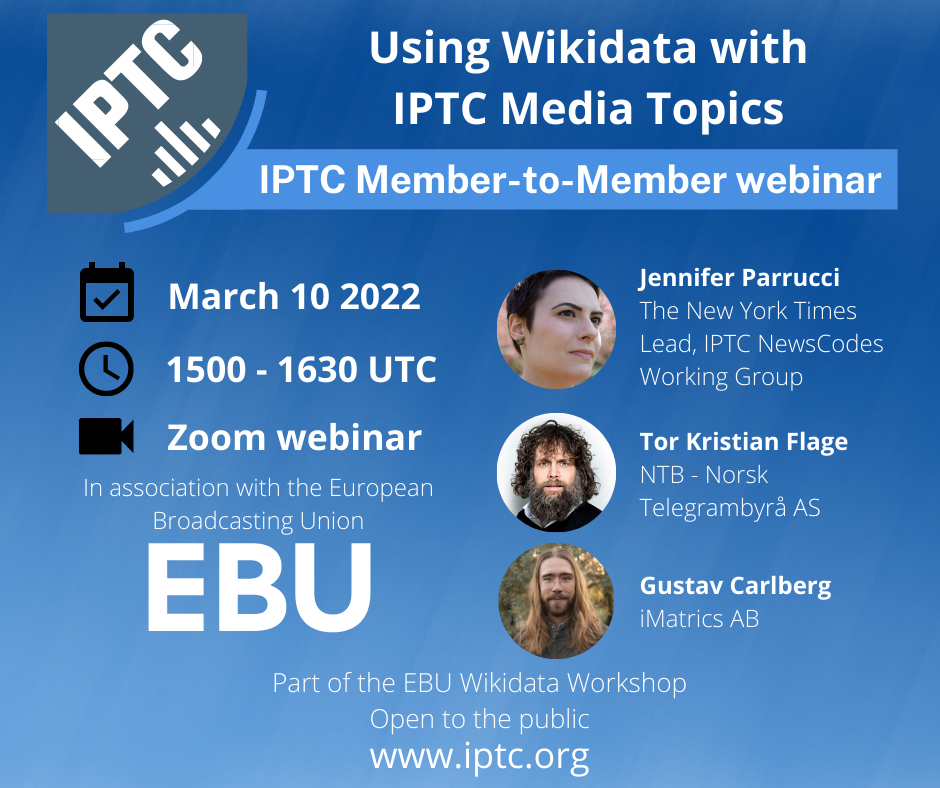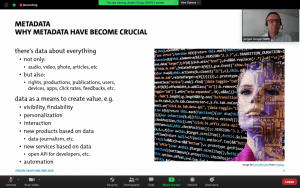Categories
Archives

IPTC Managing Director Brendan Quinn presented at the European Broadcasting Union’s Data Technology Seminar last week.
The DataTech Seminar, known in previous years as the Metadata Developers Network, brought over 100 technologists together in person in Geneva to discuss topics related to managing data at broadcasters in Europe and around the world.
Brendan spoke on Tuesday 21st March on a panel discussing Artificial Intelligence and the Media. Brendan used the opportunity to discuss IPTC’s current work on “do not train” signals in metadata, and on establishing best practices for how AI tools can embed metadata indicating the origin of their media.
The work of C2PA, Project Origin and Content Authenticity Initiative on addressing content provenance and tamper-evident media was also highlighted by Brendan during the panel discussion, as this relates to the prevalence of “deepfake” content that can be created by generative AI engines.
On Wednesday 22nd March, Brendan spoke in lieu of Paul Kelly, lead of the IPTC Sports Content Working Group about the IPTC SportSchema project. The session was called “IPTC Sport Schema – the next generation of sports data.” An evolution of IPTC’s SportsML standard, IPTC Sport Schema brings our 20 years of experience in sports data markup to the world of Knowledge Graphs and the Semantic Web. The specification is coming close to a version 1, so we were very proud to present it to some of the world’s top broadcasters and industry players.
The IPTC SportSchema site sportschema.org now includes comprehensive documentation of the ontology behind sports data model, examples of how it can be queried using SPARQL, example data files and instance diagrams showing how it can be used to represent common sports such as athletics, soccer, golf and hockey.
We look forward to discussing IPTC Sport Schema much more over the coming months, as we draw close to its general release.
EBU members can watch the full presentation at the EBU.ch site.
Next Thursday 10th March, IPTC members will be presenting a webinar on IPTC Media Topics and Wikidata. It will be held in association with the European Broadcasting Union as part of the EBU Wikidata Workshop.

The webinar is part of our series of “member-to-member” webinars, but as this is a special event in conjunction with EBU, attendance is open to the public.
The IPTC component of the workshop features Jennifer Parrucci of The New York Times, lead of the IPTC NewsCodes Working Group which manages the Media Topics vocabulary, and Managing Director of IPTC Brendan Quinn, introducing Media Topics and how they can be used with Wikidata. Then Tor Kristian Flage of Norwegian agency NTB and Gustav Carlberg of vendor and IPTC member iMatrics will present on their recent project to integrate IPTC Media Topics and Wikidata into their newsroom workflow.
Other speakers at the workshop on March 10th include France TV, RAI Italy, YLE Finland, Gruppo RES, Media Press and Perfect Memory.
Register to attend the full workshop (including the IPTC webinar) for free here.
 On July 1st 2020, IPTC was invited to participate in an online workshop held by the Arab States Broadcasting Union (ASBU).
On July 1st 2020, IPTC was invited to participate in an online workshop held by the Arab States Broadcasting Union (ASBU).
In a joint presentation, Brendan Quinn (IPTC Managing Director) and Robert Schmidt-Nia (Chair of IPTC and consultant with DATAGROUP Consulting Services) spoke on behalf of IPTC and Jürgen Grupp (data architect with the German public broadcaster SWR) spoke on behalf of the European Broadcasting Union.
The invitation was extended to IPTC and EBU because ASBU is looking at creating a common framework for sharing content between ASBU member broadcasters.
Jürgen Grupp started with an overview of why metadata is important in broadcasting and media organisations, and introduced the EBU’s high-level architecture for media, the EBU Class Conceptual Data Model (CCDM). and the EBUCore metadata set. Jürgen then gave examples of how CCDM and EBUCore are implemented by some European broadcasters.
Next, Brendan Quinn introduced IPTC and the IPTC News Architecture, the underlying logical model behind all of IPTC’s standards. We then took a deep dive into some video-related NewsML-G2 constructs like partMeta (used to describe metadata for parts of a video such as the rights and descriptive metadata for multiple time-based shots within a single video file) and contentSet (used to link to multiple renditions of the same video in different formats, resolutions or quality levels).
Then Robert Schmidt-Nia described some real-world examples of implementation of NewsML-G2 and the IPTC News Architecture at broadcasters and news agencies in Europe, in particular touching on the real-world issues of whether to “push” content or to create a “content API” that customers can use to select and download the content that they would like.
A common theme throughout our presentations was that the representation of the data in XML, RDF, JSON or some other format is relatively easy to change, but the important decision is what logical model to use and how to agree on the meaning (semantics) of terms and vocabularies.
A robust question and answer period touched on wide-ranging issues from the choices between XML, RDF and JSON, extending standardised models and vocabularies, and what decisions should be made to decide how to proceed.
This was one of the first meetings of ASBU on this topic and we look forward to assisting them further on their journey to metadata-based content sharing between their members.